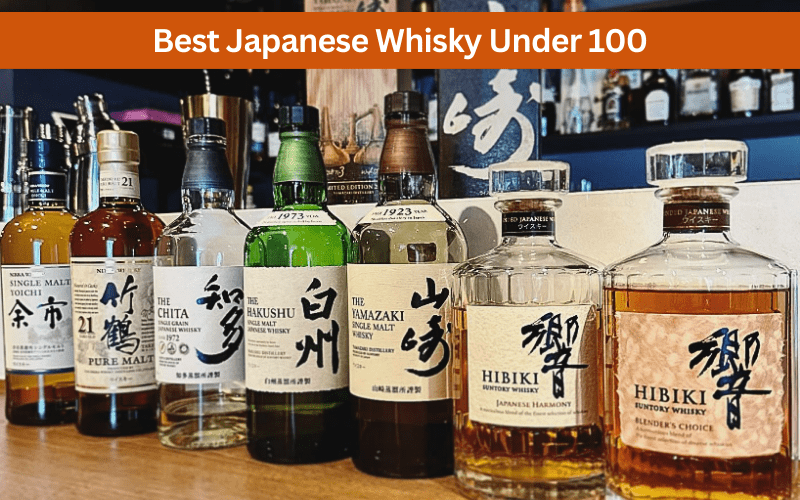I’ve always had an insatiable passion for whisky, constantly on the lookout for unique and exceptional bottles that tantalize the taste buds without breaking the bank. And in my exploration of the whisky world, I stumbled upon a delightful treasure trove from the Land of the Rising Sun: The best Japanese whisky under 100. The allure of these bottles lies not only in their affordability but also in the sheer craftsmanship and distinct flavors that encapsulate the essence of Japanese whisky. Allow me to take you on a personal journey, sharing my experiences and uncovering the hidden gems that make this selection truly remarkable. Get ready to embark on a tasting adventure as we unveil the best Japanese whisky under 100.
What Is A Japanese Whisky?
Japanese whisky is a type of distilled spirit produced in Japan that follows the traditional methods of whisky production, heavily influenced by Scotch whisky.
It is known for its meticulous craftsmanship, attention to detail, and unique flavor profiles, offering a wide range of styles from smooth and delicate to rich and complex.
Japanese whisky has gained international acclaim for its exceptional quality and has become a popular choice among whisky enthusiasts worldwide.
So, let’s explore the Best Japanese Whisky under 100 below:
Top Best Japanese Whiskey Under $100
Here are some of top rated Japanese whiskeys under $100 you should know:
Akashi “White Oak”
A single malt whisky from the White Oak Distillery, offering a smooth and balanced character.
Tasting Note: Delicate floral notes with hints of vanilla and caramel, followed by a subtle smokiness and a long, satisfying finish.
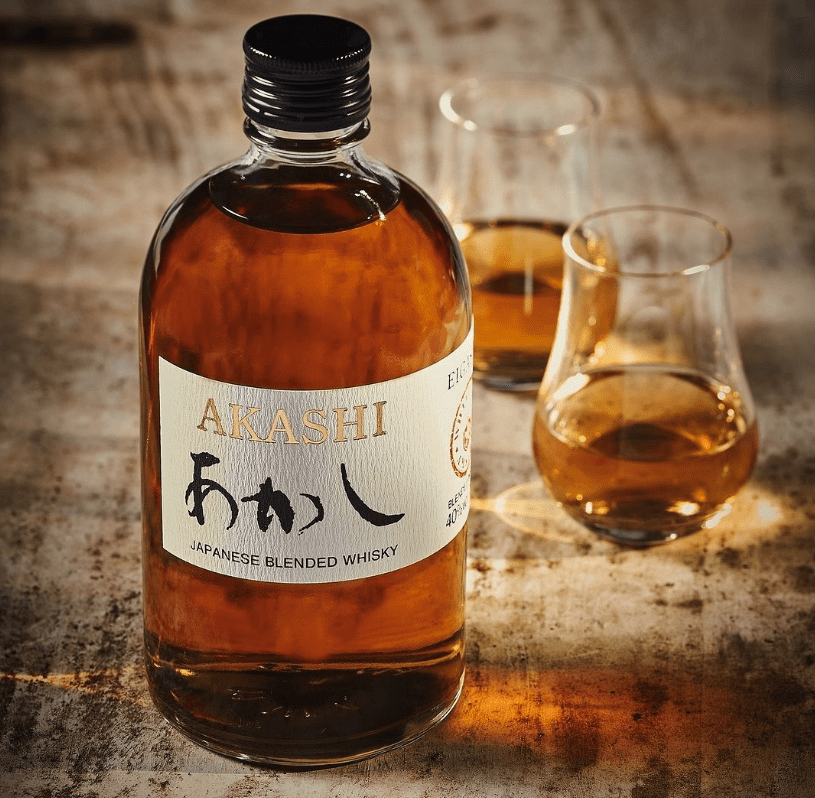
Chichibu Ichiro’s Malt & Grain Whisky
A highly sought-after blend created by Ichiro Akuto, featuring a combination of malt and grain whiskies.
Tasting Note: Rich and complex flavors of dried fruits, chocolate, and spices, accompanied by a velvety texture and a lingering sweet finish.
Fukano 10-Year
A 10-year-old rice whisky from the Fukano Distillery, showcasing the unique use of rice in whisky production.
Tasting Note: Smooth and elegant with notes of tropical fruits, honey, and a touch of oak, culminating in a warm and slightly spicy finish.
Hibiki Japanese Harmony
A blended whisky from the renowned Hibiki distillery, known for its meticulous blending techniques.
Tasting Note: Harmonious blend of sweet and fruity flavors, including plum, rose, and apricot, with a gentle oak influence and a smooth, lingering finish.
Kamiki Blended Malt Whisky
A blended malt whisky infused with Japanese cedar, providing a unique aromatic experience.
Tasting Note: Intriguing mix of floral, woody, and smoky notes, with hints of sandalwood, green tea, and citrus, leading to a subtly spiced finish.
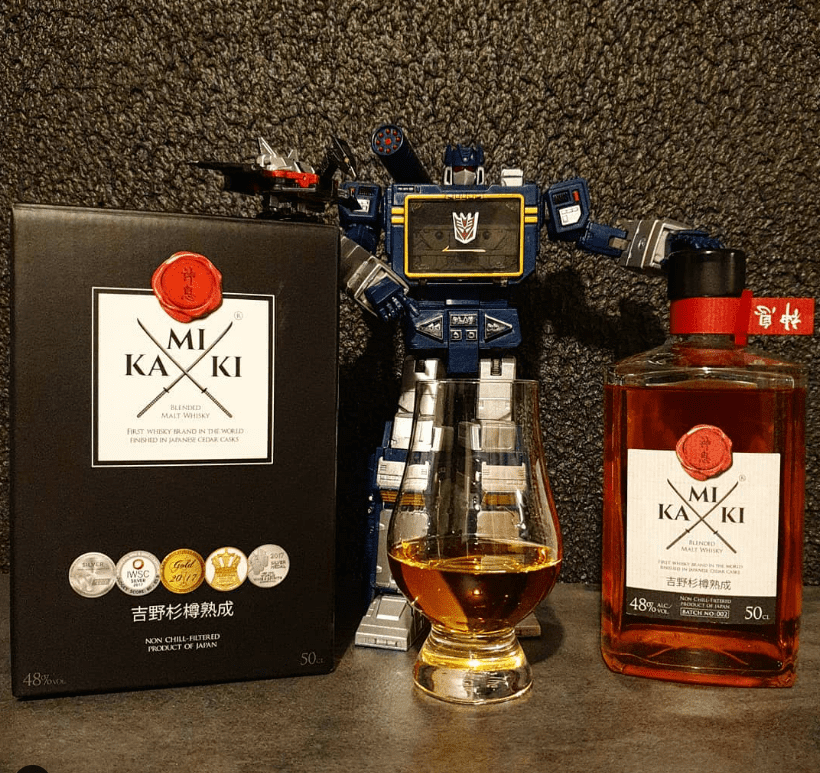
Kiuchi No Shizuku Hitachino Nest Whisky
A single malt whisky from the Kiuchi Brewery, showcasing their expertise in craft beer and whisky production.
Tasting Note: Rich and malty with flavors of toffee, dried fruits, and a touch of cocoa, followed by a long, warming finish with hints of spice.
Kujira Ryukyu Whisky
A whisky from the Kumesen Distillery, made with a unique blend of malted barley and aged in American oak casks.
Tasting Note: Smooth and creamy with notes of honey, vanilla, and tropical fruits, accompanied by a gentle spiciness and a lingering, sweet aftertaste.
Mars Iwai Blue Label
A blend of malt whiskies from Mars Shinshu Distillery, offering a refined and approachable profile.
Tasting Note: Soft and fruity with flavors of orchard fruits, malted barley, and a touch of honey, leading to a clean and crisp finish.
Miyagikyo Single Malt
A single malt whisky from the Miyagikyo Distillery, showcasing the elegant and fruity style of the distillery.
Tasting Note: Complex layers of orchard fruits, citrus, and delicate floral notes, balanced by a gentle spiciness and a long, graceful finish.
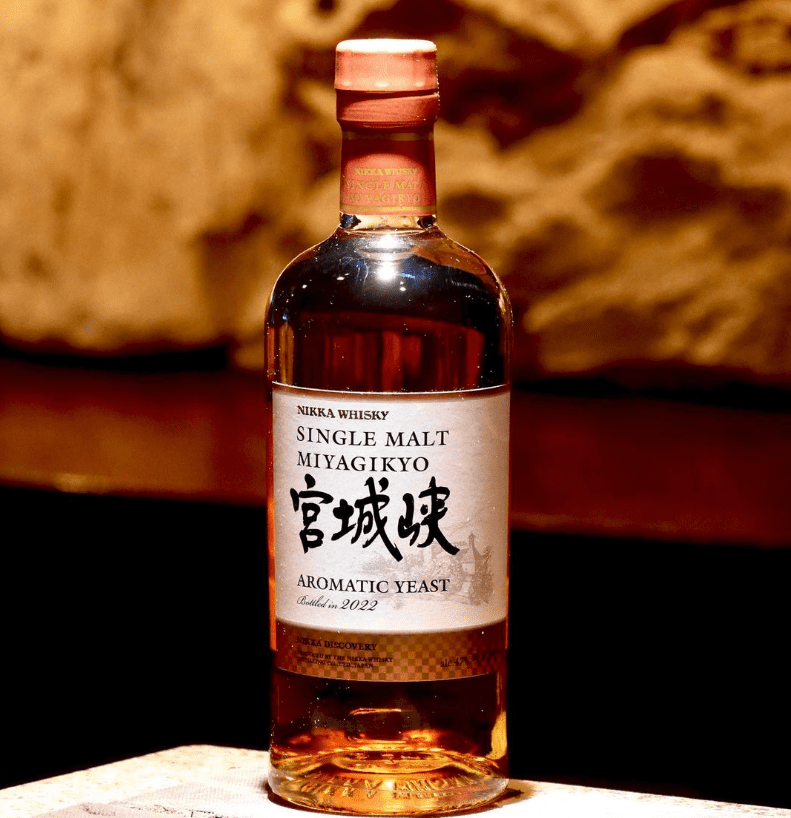
Nikka Whisky From The Barrel
A bold and robust blended whisky from the renowned Nikka distillery, known for its craftsmanship.
Tasting Note: Intense and full-bodied with flavors of caramel, dark chocolate, dried fruits, and a hint of peat smoke, culminating in a long and satisfying finish.
Ohishi Sherry Single Cask Whisky
A single cask whisky from Ohishi Distillery, aged in sherry casks to impart rich and deep flavors.
Tasting Note: Luscious and indulgent with notes of raisins, dark chocolate, roasted nuts, and a touch of spice, leading to a velvety and lingering finish.
Suntory Whisky Toki
A blend of malt and grain whiskies from Suntory, designed for versatility and easy enjoyment.
Tasting Note: Smooth and light with subtle sweetness, featuring flavors of green apple, honey, and white pepper, followed by a clean and crisp finish.
The Hakushu Single Malt Whisky
A single malt whisky from the picturesque Hakushu Distillery, known for its fresh and vibrant character.
Tasting Note: Crisp and lively with notes of green fruits, herbs, and a gentle smokiness, offering a refreshing and invigorating taste experience.
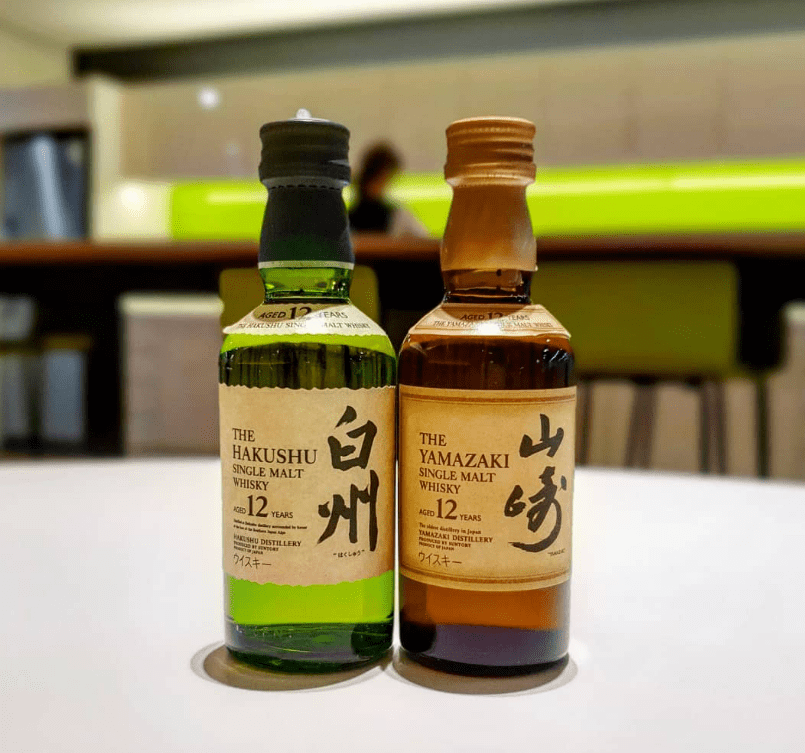
White Oak Akashi Blended Whisky
A blended whisky from the White Oak Distillery, offering a versatile and approachable profile.
Tasting Note: Smooth and mellow with flavors of honey, vanilla, and orchard fruits, complemented by a touch of spice and a lingering, creamy finish.
Yoichi Single Malt
A single malt whisky from the Yoichi Distillery, showcasing the robust and smoky style of the distillery.
Tasting Note: Rich and peaty with notes of roasted nuts, dark chocolate, and maritime influence, delivering a bold and lingering smoky finish.
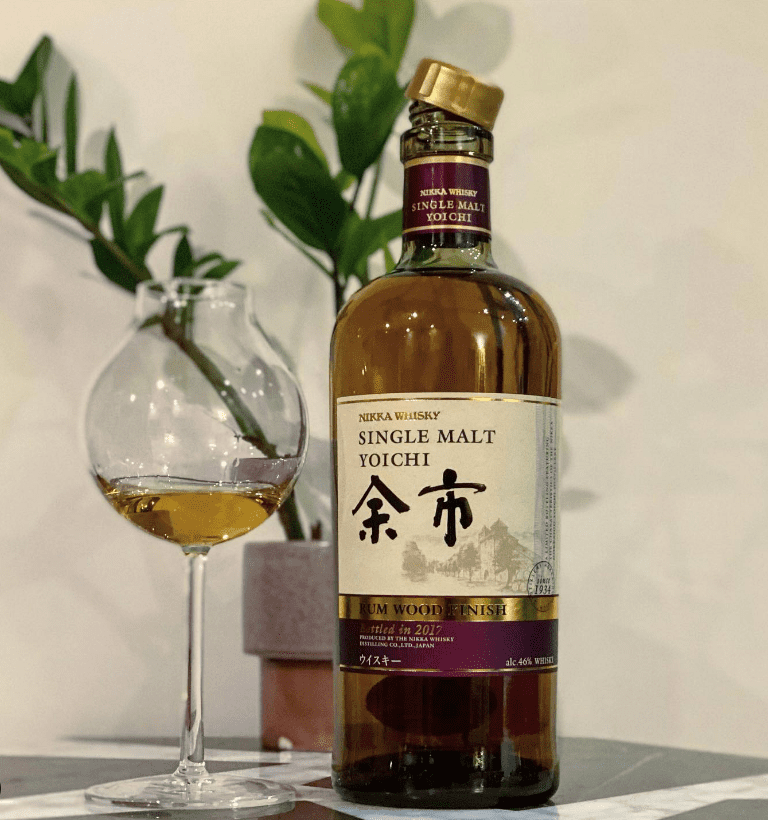
The Best Japanese Single Malt Whiskey under 100
When it comes to Japanese single malt whisky under $100, there are several exceptional options to explore. Here are some of the best choices:
- Akashi “White Oak” Single Malt: Crafted by the White Oak Distillery, this whisky offers a harmonious balance of flavors with delicate floral notes, hints of vanilla, and a subtle smokiness. It provides a smooth and satisfying experience.
- Miyagikyo Single Malt: From the Miyagikyo Distillery, this single malt whisky captivates with its elegant and fruity profile. It unveils complex layers of orchard fruits, citrus, and delicate floral notes, complemented by a gentle spiciness and a graceful, long finish.
- The Hakushu Single Malt Whisky: Known for its picturesque distillery, Hakushu presents a single malt with a fresh and vibrant character. Expect crisp and lively flavors of green fruits, herbs, and a gentle smokiness, delivering a refreshing and invigorating taste experience.
- Yoichi Single Malt: This whisky hails from the Yoichi Distillery and showcases a robust and smoky style. With rich and peaty characteristics, it delights the palate with notes of roasted nuts, dark chocolate, and maritime influences, culminating in a bold and lingering smoky finish.
These Japanese single malt whiskies offer exceptional quality and a wide range of flavors, ensuring a memorable drinking experience. Note that availability and prices may vary based on location and market conditions.
The Best Blended Whiskies under $100
When looking for the best Japanese whisky under 100 which are blended ones, there are a few options worth looking into. Here are some great options:
- Hibiki Japanese Harmony: Crafted by the renowned Hibiki distillery, this blended whisky offers a harmonious fusion of sweet and fruity flavors. Plum, rose, and apricot notes intertwine with gentle oak influences, resulting in a smooth and lingering finish.
- Kamiki Blended Malt Whisky: Infused with Japanese cedar, this blended malt whisky provides a unique aromatic experience. Sandalwood, green tea, and citrus notes combine with floral, woody, and smoky elements, culminating in a subtly spiced finish.
- Nikka Whisky From The Barrel: A bold and robust blended whisky from Nikka, known for its craftsmanship. Expect intense flavors of caramel, dark chocolate, dried fruits, and a hint of peat smoke. It delivers a long and satisfying finish.
- Suntory Whisky Toki: This blend from Suntory is designed for versatility and easy enjoyment. Smooth and light, it features subtle sweetness with flavors of green apple, honey, and white pepper. The finish is clean and crisp.
These blended whiskies offer exceptional quality and a diverse range of flavors, catering to various preferences. Availability and prices may vary depending on your location and market conditions.
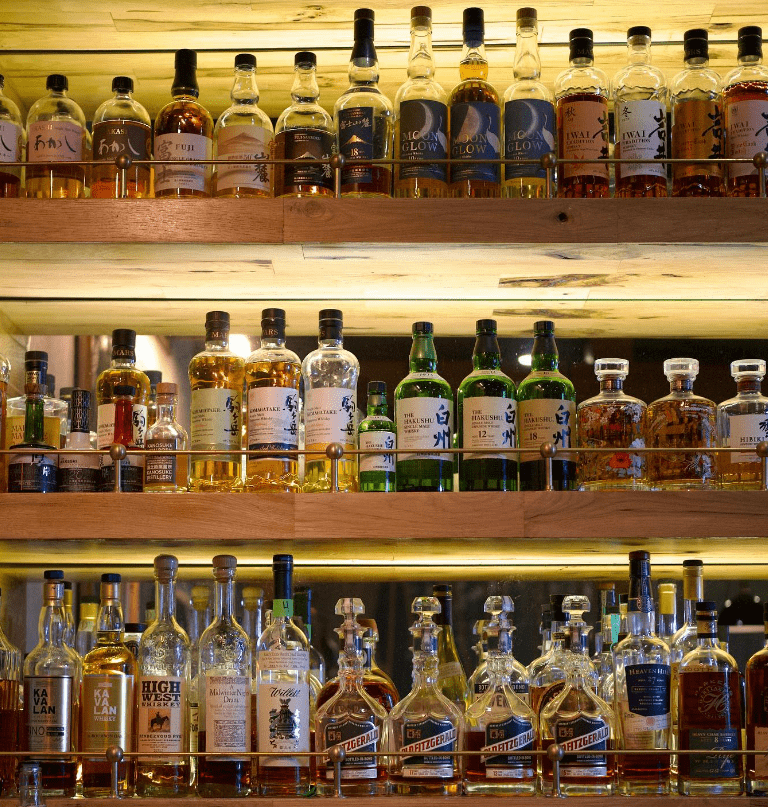
Why is Japanese Whiskey Expensive?
Japanese whisky has gained a reputation for being expensive due to several factors:
- Limited Supply: Many Japanese whisky distilleries have limited production capacity, leading to a scarcity of certain expressions. As demand for Japanese whisky has grown globally, the limited supply drives up prices.
- Production Methods: Japanese whisky production often involves traditional and meticulous methods inspired by Scotch whisky. From fermentation to distillation and aging, the attention to detail and craftsmanship contribute to the higher cost of production.
- Quality of Ingredients: Japanese whisky distilleries prioritize using high-quality ingredients, including malted barley, water, and yeast. Additionally, some distilleries experiment with unique grains like rice or locally sourced ingredients, further increasing production costs.
- Longer Aging Periods: Many Japanese whiskies undergo extended aging periods to develop complex flavors and achieve desired characteristics. The longer maturation requires additional storage space and increases costs associated with warehousing and aging.
- Artistry and Innovation: Japanese whisky is often celebrated for its artistry and innovation. Distilleries invest in continuous experimentation, craftsmanship, and blending techniques to create unique and exceptional expressions, resulting in higher production costs.
- International Recognition: Over the years, Japanese whiskies have garnered numerous awards and global recognition, further boosting their prestige and driving up prices due to increased demand from whisky enthusiasts and collectors.
Is Japanese Whisky any Good?
Japanese whisky is highly regarded and considered to be of excellent quality. Here are several reasons why Japanese whisky is widely appreciated:
- Meticulous Craftsmanship: Japanese whisky distilleries are known for their meticulous attention to detail, following traditional production methods and often drawing inspiration from Scotch whisky. This commitment to craftsmanship results in whiskies that are well-crafted and refined.
- Distinctive Flavor Profiles: Japanese whiskies offer a unique flavor profile that sets them apart. From light and delicate to rich and complex, they showcase a wide range of flavors, often incorporating elements of fruitiness, floral notes, and a balance of sweetness and smokiness.
- Blending Expertise: Japanese whisky distilleries have honed their blending techniques over the years, creating exceptional blends that showcase a harmonious balance of flavors. The art of blending allows them to achieve complexity and consistency in their whisky expressions.
- Attention to Detail: Japanese whisky production emphasizes precision and consistency, ensuring that each batch meets high standards. From the selection of ingredients to the distillation process and aging in carefully chosen casks, every step is meticulously executed to create a high-quality product.
- Awards and Recognition: Japanese whiskies have gained international acclaim and have received numerous awards and accolades from prestigious whisky competitions worldwide. This recognition further solidifies their reputation for excellence.
- Cultural Heritage: Japanese whisky carries a sense of cultural heritage and tradition, drawing from centuries-old whisky-making techniques. The combination of Japanese artistry, precision, and reverence for nature contributes to the overall appeal and quality of Japanese whiskies.
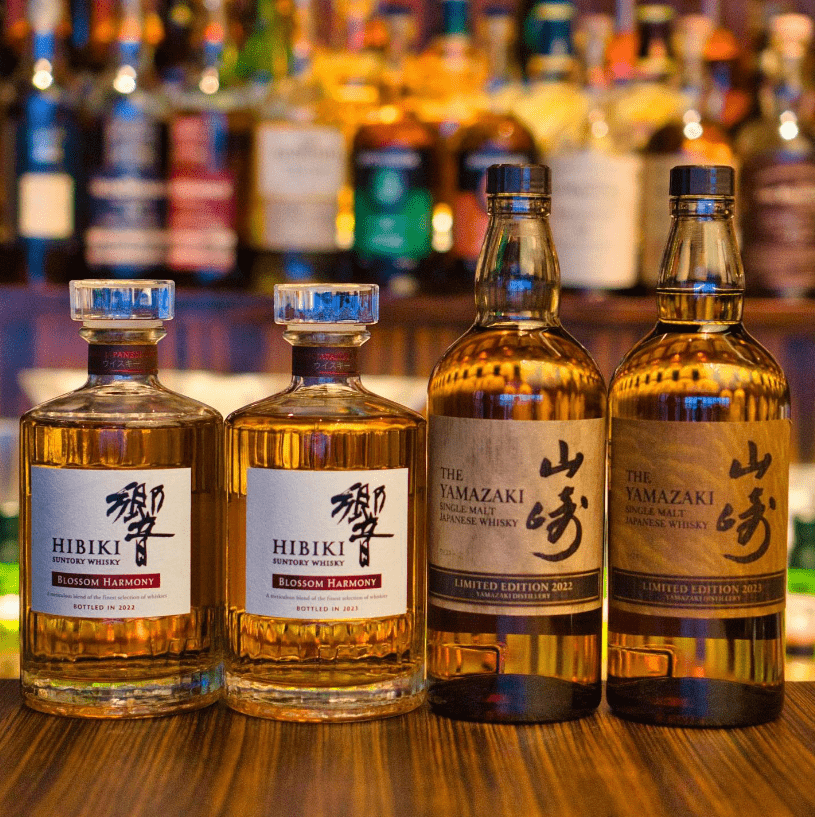
How is a Japanese Whisky Made?
Japanese whisky is made through a meticulous process that combines traditional whisky-making techniques with innovative approaches. While there may be slight variations among distilleries, here is a general overview of how Japanese whisky is made:
- Malting: The process begins with malted barley, which is soaked in water and allowed to germinate. The germinated barley is then dried using hot air in a kiln or using peat smoke, depending on the desired flavor profile.
- Mashing: The malted barley is ground into a coarse powder known as grist. It is then mixed with hot water in mash tuns to extract the sugars, creating a sweet liquid called wort.
- Fermentation: The wort is transferred to fermentation vessels, typically made of wood or stainless steel. Yeast is added to the wort, triggering fermentation. This process converts the sugars into alcohol, resulting in a liquid called “wash” with a low alcohol content.
- Distillation: The wash is distilled in pot stills or column stills, depending on the distillery’s preference. Pot stills are commonly used to create single malt whisky, while column stills are utilized for grain whisky production. Distillation takes place in multiple stages, separating the alcohol from impurities and creating a higher proof spirit known as “new make spirit.”
- Maturation: The new make spirit is transferred to oak casks for aging. Japanese whisky distilleries often use a variety of cask types, including ex-bourbon, sherry, and Mizunara oak casks. The whisky matures over a specified period, absorbing flavors and characteristics from the wood.
- Blending: Once the whiskies have matured, master blenders assess and select casks to create the desired flavor profile. Blending involves combining different single malt and grain whiskies in precise proportions to achieve the desired balance and complexity.
- Bottling: After the blending process, the whisky is typically diluted to the desired alcohol by adding pure water. It is then filtered and bottled for distribution and consumption.
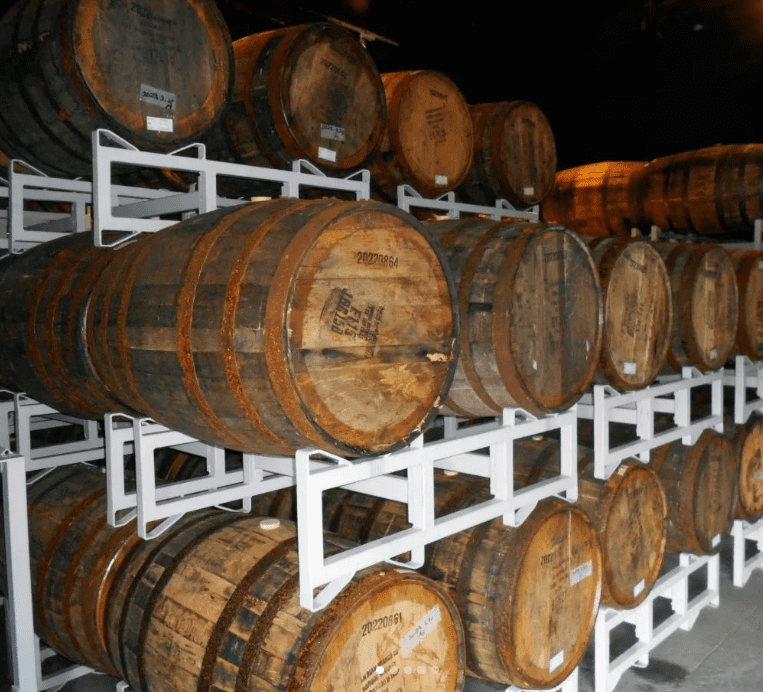
Ingredients of Japanese Whisky
Japanese whisky typically includes the following key ingredients:
- Malted Barley: Barley is the primary grain used in the production of Japanese whisky. Malted barley refers to barley that has been soaked in water, allowed to germinate, and then dried using hot air or peat smoke. It provides the essential sugars necessary for fermentation.
- Water: High-quality water is crucial in Japanese whisky production. Distilleries often have access to pristine water sources, such as springs or underground wells, which contribute to the character and purity of the whisky.
- Yeast: Yeast is responsible for fermenting the sugars in the barley, converting them into alcohol during the fermentation process. Different strains of yeast can impart distinct flavors and aromas to the final whisky.
- Casks: Oak casks play a significant role in maturing and aging Japanese whisky. Common types of casks used include ex-bourbon barrels, sherry casks, and Japanese Mizunara oak casks. These casks contribute flavors, tannins, and unique characteristics to the whisky during the aging process.
While barley, water, yeast, and casks are the fundamental ingredients, it’s worth noting that some Japanese whiskies may incorporate other grains, such as corn or rice, to create different styles or experiment with unique flavor profiles.
Additionally, some distilleries may employ various types of malted barley or use different water sources to impart specific characteristics to their whiskies.
The precise combination of these ingredients, along with the distillation and aging processes, contributes to the distinct flavors, aromas, and overall quality of Japanese whisky.
Factors to Consider When Choosing
When choosing a Japanese whisky, several factors come into play. Here are some key considerations to help you make an informed decision:
- Age Statement vs. No Age Statement: Japanese whiskies often come with age statements, indicating the number of years the whisky has been matured. Older whiskies typically offer more complexity and depth. However, some distilleries also produce exceptional no-age-statement whiskies that focus on flavor profiles rather than specific age indications.
- Single Malt vs. Blended Whisky: Decide whether you prefer single malt or blended whisky. Single malt whiskies are made from malted barley and produced at a single distillery, showcasing the unique characteristics of that distillery. Blended whiskies, on the other hand, combine whiskies from different distilleries, offering a harmonious balance of flavors.
- Flavor Profile: Consider the flavor profile you enjoy. Japanese whiskies range from light and delicate to rich and smoky. Some may exhibit fruity, floral, or even umami characteristics. Tasting notes and descriptions can provide insights into the flavor profile of a whisky, helping you find one that aligns with your preferences.
- Distillery and Style: Explore the distilleries and their respective styles. Each distillery may have its own signature characteristics, such as smokiness, sweetness, or specific cask influences. Researching and tasting whiskies from different distilleries can help you discover your preferred styles.
- Price Range: Determine your budget. Japanese whiskies vary in price, with some rare or limited editions commanding higher prices. Establishing a price range will help narrow down the options and find whiskies that offer the best value for your budget.
- Personal Taste and Experimentation: Ultimately, personal taste plays a significant role in selecting a whisky. Consider your own preferences, whether you enjoy a specific flavor profile, or if you prefer to explore new and unique expressions. Experimentation and trying different whiskies can be an exciting journey of discovery.
By considering these factors, you can find a Japanese whisky that aligns with your preferences, budget, and desired experience.
Remember, tasting notes, expert recommendations, and seeking guidance from whisky specialists can also provide valuable insights and assistance in making your selection.
Pairing Japanese Whisky with Food
Pairing Japanese whisky with food can elevate both the flavors of the whisky and the culinary experience. Here are some general guidelines and pairing suggestions:
- Sushi and Sashimi: The delicate and refined flavors of Japanese whisky pair exceptionally well with fresh sushi and sashimi. Opt for lighter and floral whiskies to complement the subtle flavors of the seafood.
- Grilled Meats: Japanese whisky with smoky or peaty characteristics can harmonize beautifully with grilled meats, such as yakitori (grilled skewered chicken) or yakiniku (Japanese-style BBQ). The smokiness of the whisky complements the charred flavors of the meats.
- Tempura: The crispy texture and delicate flavors of tempura can be enhanced by pairing it with a lighter Japanese whisky. Look for whiskies with citrus or floral notes to complement the subtle nuances of the tempura.
- Cheese and Charcuterie: Japanese whisky can be paired with a variety of cheeses and charcuterie. Creamy and slightly sweet whiskies can complement soft and mild cheeses, while smoky or peaty whiskies can provide a contrasting flavor profile with aged and stronger cheeses.
- Matcha-based Desserts: Matcha-flavored desserts, such as green tea ice cream or matcha cakes, can be complemented by Japanese whisky with herbal or fruity notes. The combination of earthy matcha flavors and the whisky’s complexity can create a delightful dessert pairing.
- Dark Chocolate: Rich and full-bodied Japanese whiskies can pair well with dark chocolate. The whisky’s complex flavors, often featuring notes of dried fruits, spices, or caramel, can complement the bittersweetness of the chocolate.
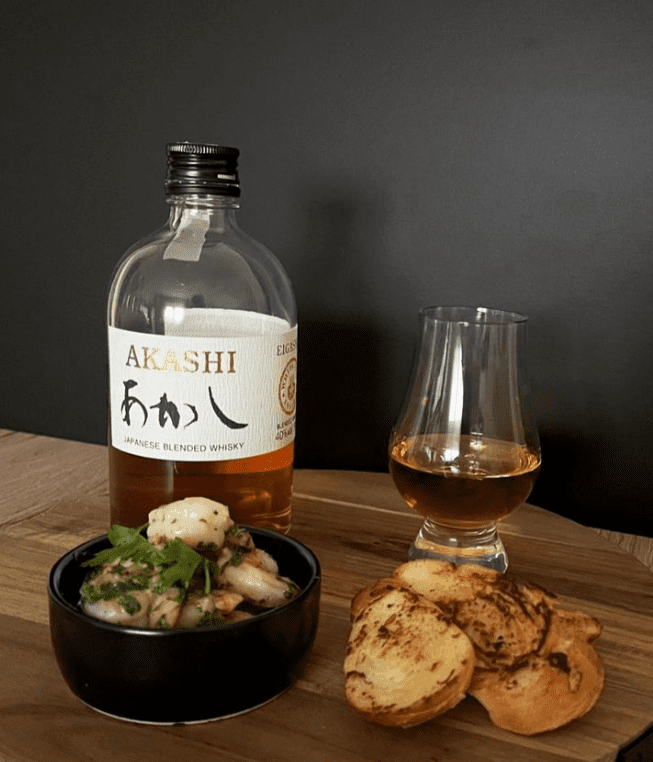
Cocktail Inspirations with Japanese Whisky
Japanese whisky lends itself well to creating unique and flavorful cocktails. Here are some cocktail inspirations that showcase the versatility of Japanese whisky:
- Japanese Highball: A classic and refreshing cocktail, the Japanese Highball combines Japanese whisky with sparkling water or soda. Serve it over ice in a tall glass, garnished with a twist of citrus peel. The effervescence and lightness of the highball allow the whisky’s flavors to shine.
- Whisky Sour: A twist on the traditional Whisky Sour, this cocktail combines Japanese whisky with freshly squeezed lemon juice, simple syrup, and a dash of egg white. Shake the ingredients with ice and strain into a glass, garnishing with a cherry or lemon twist.
- Mizuwari: Mizuwari is a Japanese technique that involves diluting whisky with ice and water to achieve a refreshing and harmonious drink. Combine Japanese whisky, ice cubes, and a splash of water in a glass. Stir gently to chill and mellow the flavors.
- Japanese Old Fashioned: Put a Japanese spin on the classic Old Fashioned cocktail. Muddle a sugar cube with a few dashes of aromatic bitters. Add Japanese whisky and ice to the glass, stirring until chilled. Garnish with a twist of orange peel or a cherry.
- Toki Highball: Specifically highlighting Suntory Whisky Toki, this highball variation combines the whisky with sparkling water and a dash of grapefruit bitters. Serve over ice and garnish with a grapefruit twist for a vibrant and citrusy experience.
- Cherry Blossom Fizz: Create a floral and effervescent cocktail by mixing Japanese whisky with elderflower liqueur, freshly squeezed lemon juice, and soda water. Shake the whisky, elderflower liqueur, and lemon juice with ice, strain into a glass, and top with soda water. Garnish with a cherry or edible flower.
Feel free to experiment with ingredients and proportions to tailor these cocktails to your taste preferences. Japanese whisky’s unique flavor profiles can add depth and complexity to your cocktail creations. Cheers!
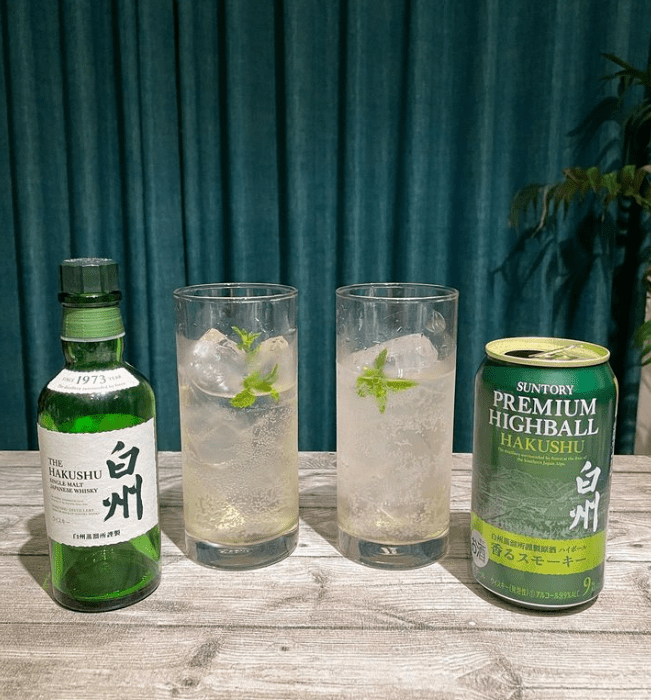
Special Facts About Japanese Whisky
Japanese whisky is known for its exceptional quality and has gained worldwide recognition. Here are some special facts about Japanese whisky:
- Inspired by Scotch Whisky: Japanese whisky has its roots in Scottish whisky-making traditions. Masataka Taketsuru, often referred to as the “Father of Japanese Whisky,” studied in Scotland and brought back the knowledge and techniques he acquired to establish the first whisky distillery in Japan.
- Artisanal Craftsmanship: Japanese whisky production places a strong emphasis on artisanal craftsmanship and attention to detail. From selecting high-quality ingredients to employing precise distillation methods and meticulous blending techniques, Japanese distillers strive for excellence in every step of the process.
- Mizunara Oak Casks: One unique aspect of Japanese whisky is the use of Mizunara oak casks for aging. Mizunara is a type of oak native to Japan and imparts distinctive flavors and aromas to the whisky, including sandalwood, incense, and spices. This contributes to the character and complexity of Japanese whiskies.
- Harmony and Balance: Japanese whisky is often praised for its harmonious and well-balanced nature. The blending expertise of Japanese distillers allows them to create whiskies that seamlessly integrate various flavors, resulting in a smooth and refined drinking experience.
- Pure Water Sources: Japan’s abundant and pristine water sources play a significant role in whisky production. Distilleries often have access to natural springs or underground wells with soft and mineral-rich water, which contributes to the overall quality and purity of the whisky.
- Limited Editions and Rarity: Some Japanese distilleries release limited-edition whiskies or single cask expressions, which are highly sought after by whisky enthusiasts and collectors. These limited releases, often aged for longer periods or showcasing unique characteristics, add to the allure and exclusivity of Japanese whisky.
- Global Recognition: In recent years, Japanese whiskies have gained significant recognition on the global stage, winning numerous awards and accolades. They have been highly praised by whisky connoisseurs and experts for their craftsmanship, flavor profiles, and overall excellence.
Japanese whisky continues to captivate whisky lovers worldwide with its rich history, meticulous production methods, and dedication to quality. It represents a fusion of tradition and innovation, resulting in exceptional whiskies that showcase the artistry and expertise of Japanese distillers.
FAQs
What makes Japanese whisky unique?
Japanese whisky is known for its meticulous craftsmanship, attention to detail, and dedication to quality. It draws inspiration from Scotch whisky production methods while incorporating distinct Japanese techniques and flavor profiles.
Can I find these whiskies outside of Japan?
Yes, many Japanese whiskies are available internationally, although availability may vary depending on your location. The popularity of Japanese whisky has led to its distribution in various markets worldwide.
Are Japanese whiskies typically peaty or smoky?
While some Japanese whiskies do have smoky or peaty characteristics, not all of them do. Japanese whiskies encompass a wide range of flavor profiles, from light and delicate to rich and complex, catering to various taste preferences.
What is the ideal way to enjoy Japanese whisky?
The ideal way to enjoy Japanese whisky largely depends on personal preference. Many people prefer sipping Japanese whisky neat or with a few drops of water to enhance the flavors. However, Japanese whisky can also be enjoyed in cocktails or mixed with other ingredients.
Are Japanese whiskies similar to Scotch whiskies?
Japanese whisky is often compared to Scotch whisky due to its historical ties and influence. While there are similarities, such as the use of malted barley and traditional production methods, Japanese whiskies have distinct characteristics that set them apart.
Can I drink Japanese whiskey with ice?
Yes, drinking Japanese whisky with ice is a common practice and can help mellow and slightly chill the whisky. However, some whisky enthusiasts prefer enjoying it neat or with a few drops of water to fully experience its flavors.
Should you freeze Japanese whiskey?
Freezing Japanese whisky is not recommended. Whisky, including Japanese whisky, should be stored at room temperature and enjoyed without extreme temperature fluctuations, as freezing can affect its flavors and aromas.
Is it cheaper to buy whisky in Japan?
It depends on various factors, including taxes, import duties, and local market dynamics. While Japanese whiskies may be more readily available in Japan, prices can vary, and certain limited editions or rare expressions may still command higher prices.
Why do people like Japanese whiskey?
People appreciate Japanese whisky for its exceptional quality, refined flavors, and the artistry involved in its production. Japanese distilleries have gained global recognition and have won numerous awards, contributing to the popularity and admiration of Japanese whisky.
Is there a recommended glassware for tasting Japanese whisky?
A tulip-shaped or Glencairn glass is often recommended for tasting Japanese whisky. These glasses concentrate the aromas, allowing you to fully appreciate the complex and nuanced flavors of the whisky. The shape also helps capture and direct the aromas to your nose.
Conclusion
In the vast world of whisky, where options abound and prices soar, discovering the best Japanese whisky under 100 is akin to uncovering hidden treasure. From the enchanting distilleries nestled in the Land of the Rising Sun, a plethora of affordable gems awaits the discerning connoisseur. With their unique flavors, meticulous craftsmanship, and undeniable allure, these whiskies captivate the senses and leave a lasting impression. Whether you savor the velvety richness of a single malt or revel in the harmonious blend of a masterful creation, the realm of the best Japanese whisky under 100 offers an exploration that is both accessible and extraordinary. So raise a glass, embark on this journey, and let the captivating world of top rated Japanese whisky under $100 transport you to new realms of delight and appreciation.
I’m Chen Mina, from Vol de Nuit, who has a special passion for bartending, especially mixing wine, beer, and cooktail. Here you will find content about alcoholic beverages, I will bring you knowledge that few people know about this drink.

